Annotated Bibliography: The Impact of Corporate Culture on Ethics
VerifiedAdded on 2023/06/04
|8
|1575
|161
Annotated Bibliography
AI Summary
This annotated bibliography presents a collection of articles focusing on the multifaceted relationship between corporate culture and business ethics. The included works explore how corporate culture influences employee behavior, ethical decision-making, job satisfaction, and innovation within organizations. Key themes include the importance of ethical leadership, the creation of ethical organizational cultures, and the role of positive psychology in improving moral behavior in the context of ICT. The bibliography also covers the link between organizational culture and job satisfaction, highlighting how employee perceptions of their work environment and relationships with colleagues impact their overall well-being. Finally, the role of organizational culture in fostering innovation is examined, with a focus on managerial practices that support and coordinate innovative activities.
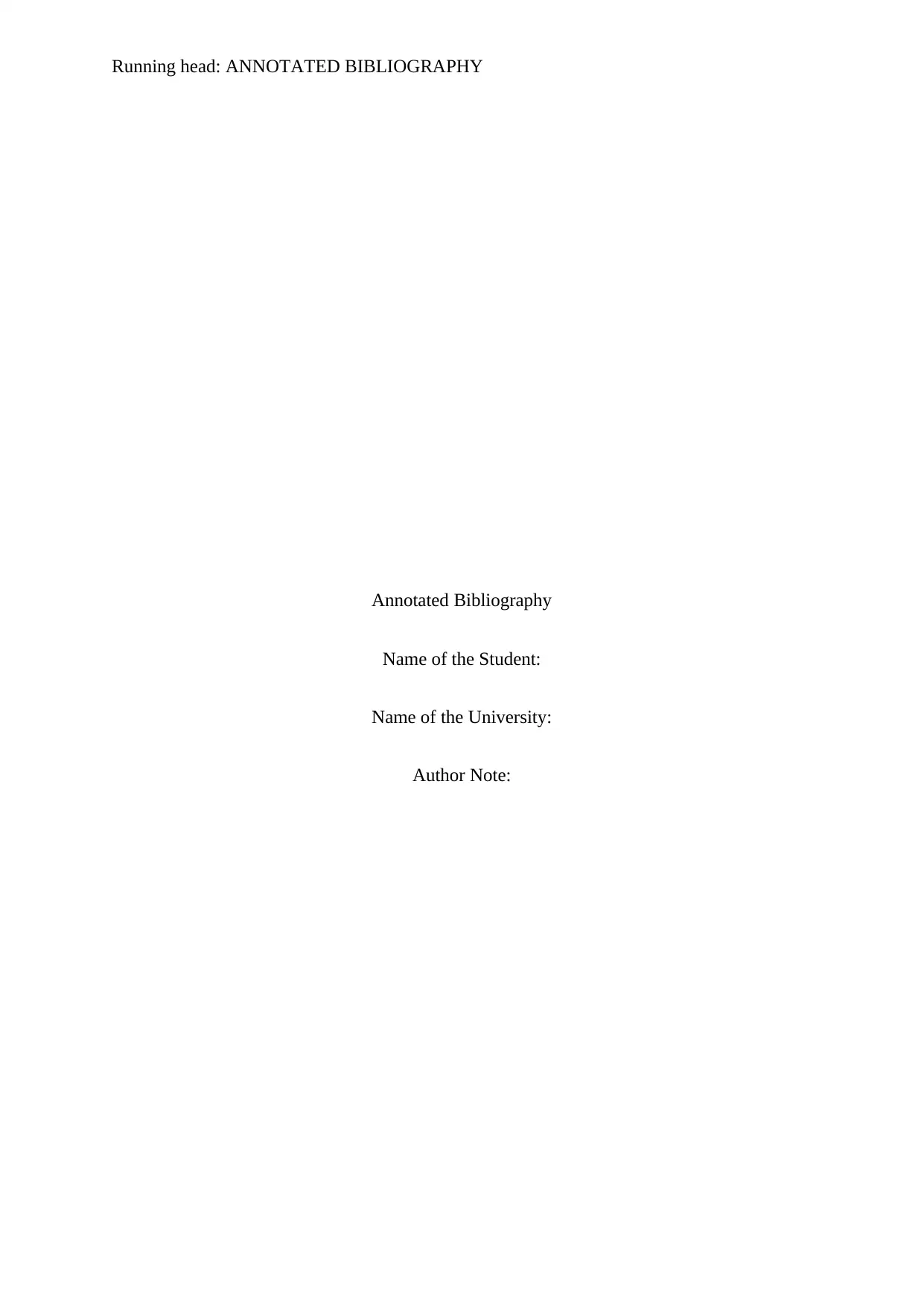
Running head: ANNOTATED BIBLIOGRAPHY
Annotated Bibliography
Name of the Student:
Name of the University:
Author Note:
Annotated Bibliography
Name of the Student:
Name of the University:
Author Note:
Paraphrase This Document
Need a fresh take? Get an instant paraphrase of this document with our AI Paraphraser
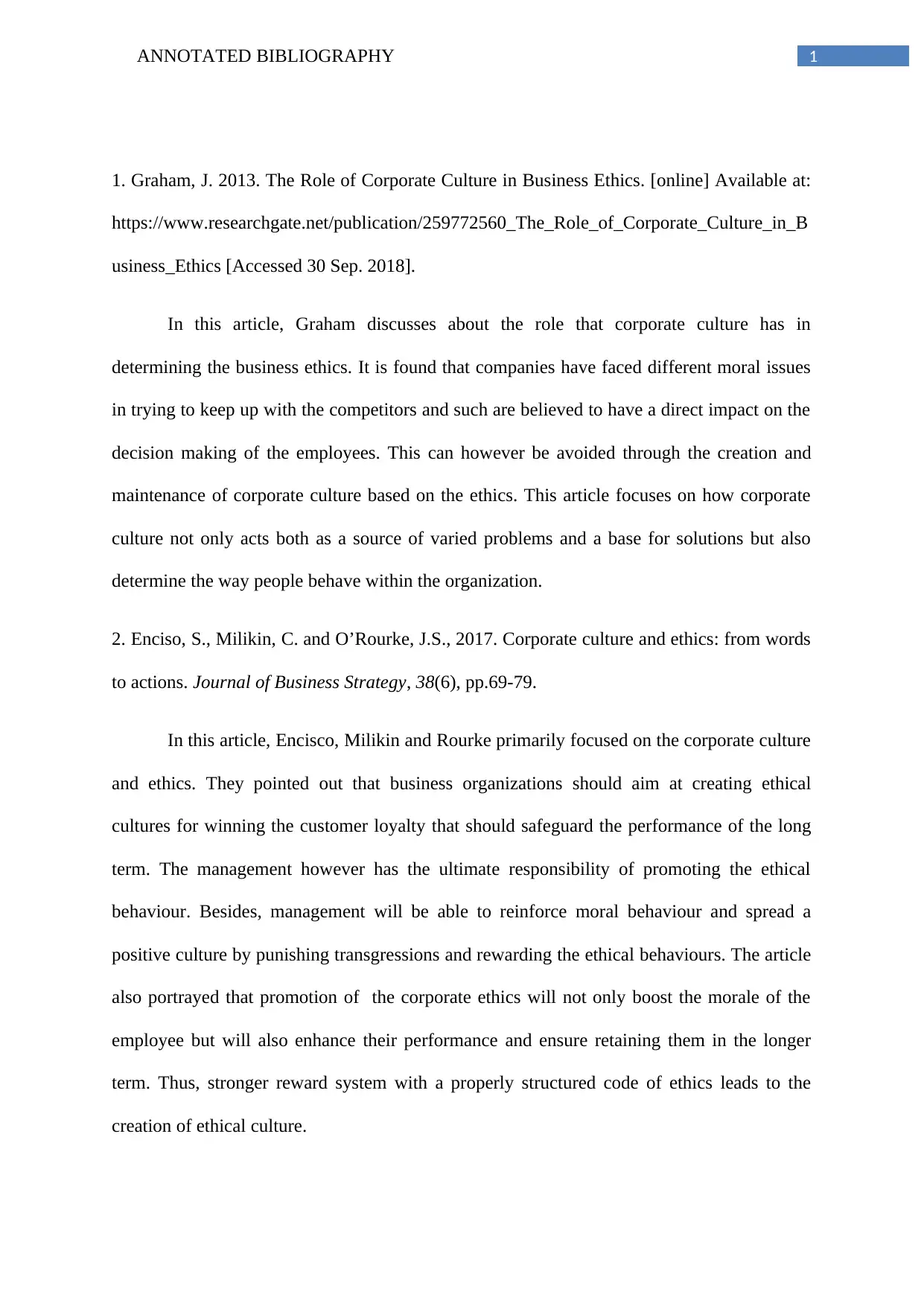
1ANNOTATED BIBLIOGRAPHY
1. Graham, J. 2013. The Role of Corporate Culture in Business Ethics. [online] Available at:
https://www.researchgate.net/publication/259772560_The_Role_of_Corporate_Culture_in_B
usiness_Ethics [Accessed 30 Sep. 2018].
In this article, Graham discusses about the role that corporate culture has in
determining the business ethics. It is found that companies have faced different moral issues
in trying to keep up with the competitors and such are believed to have a direct impact on the
decision making of the employees. This can however be avoided through the creation and
maintenance of corporate culture based on the ethics. This article focuses on how corporate
culture not only acts both as a source of varied problems and a base for solutions but also
determine the way people behave within the organization.
2. Enciso, S., Milikin, C. and O’Rourke, J.S., 2017. Corporate culture and ethics: from words
to actions. Journal of Business Strategy, 38(6), pp.69-79.
In this article, Encisco, Milikin and Rourke primarily focused on the corporate culture
and ethics. They pointed out that business organizations should aim at creating ethical
cultures for winning the customer loyalty that should safeguard the performance of the long
term. The management however has the ultimate responsibility of promoting the ethical
behaviour. Besides, management will be able to reinforce moral behaviour and spread a
positive culture by punishing transgressions and rewarding the ethical behaviours. The article
also portrayed that promotion of the corporate ethics will not only boost the morale of the
employee but will also enhance their performance and ensure retaining them in the longer
term. Thus, stronger reward system with a properly structured code of ethics leads to the
creation of ethical culture.
1. Graham, J. 2013. The Role of Corporate Culture in Business Ethics. [online] Available at:
https://www.researchgate.net/publication/259772560_The_Role_of_Corporate_Culture_in_B
usiness_Ethics [Accessed 30 Sep. 2018].
In this article, Graham discusses about the role that corporate culture has in
determining the business ethics. It is found that companies have faced different moral issues
in trying to keep up with the competitors and such are believed to have a direct impact on the
decision making of the employees. This can however be avoided through the creation and
maintenance of corporate culture based on the ethics. This article focuses on how corporate
culture not only acts both as a source of varied problems and a base for solutions but also
determine the way people behave within the organization.
2. Enciso, S., Milikin, C. and O’Rourke, J.S., 2017. Corporate culture and ethics: from words
to actions. Journal of Business Strategy, 38(6), pp.69-79.
In this article, Encisco, Milikin and Rourke primarily focused on the corporate culture
and ethics. They pointed out that business organizations should aim at creating ethical
cultures for winning the customer loyalty that should safeguard the performance of the long
term. The management however has the ultimate responsibility of promoting the ethical
behaviour. Besides, management will be able to reinforce moral behaviour and spread a
positive culture by punishing transgressions and rewarding the ethical behaviours. The article
also portrayed that promotion of the corporate ethics will not only boost the morale of the
employee but will also enhance their performance and ensure retaining them in the longer
term. Thus, stronger reward system with a properly structured code of ethics leads to the
creation of ethical culture.
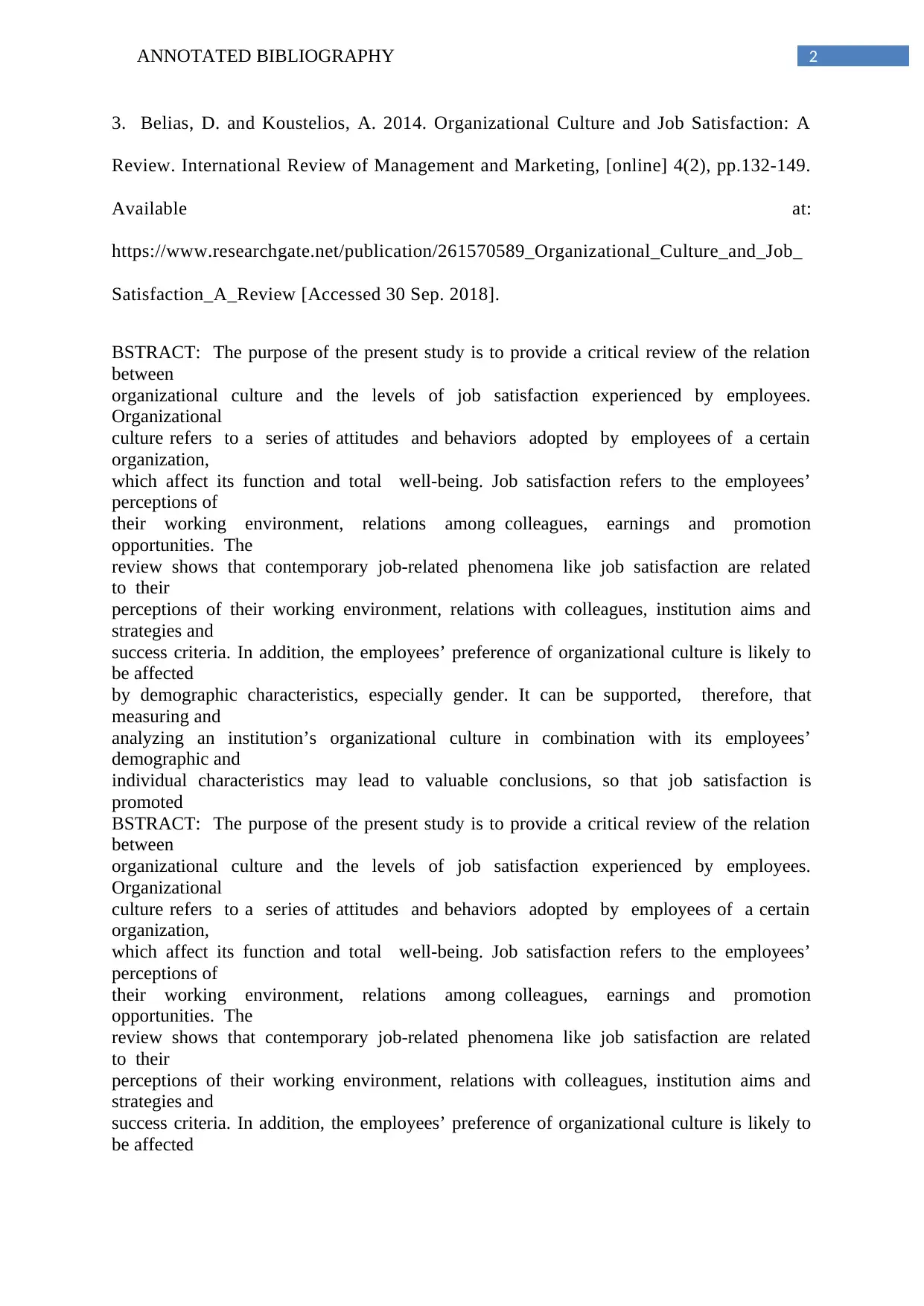
2ANNOTATED BIBLIOGRAPHY
3. Belias, D. and Koustelios, A. 2014. Organizational Culture and Job Satisfaction: A
Review. International Review of Management and Marketing, [online] 4(2), pp.132-149.
Available at:
https://www.researchgate.net/publication/261570589_Organizational_Culture_and_Job_
Satisfaction_A_Review [Accessed 30 Sep. 2018].
BSTRACT: The purpose of the present study is to provide a critical review of the relation
between
organizational culture and the levels of job satisfaction experienced by employees.
Organizational
culture refers to a series of attitudes and behaviors adopted by employees of a certain
organization,
which affect its function and total well-being. Job satisfaction refers to the employees’
perceptions of
their working environment, relations among colleagues, earnings and promotion
opportunities. The
review shows that contemporary job-related phenomena like job satisfaction are related
to their
perceptions of their working environment, relations with colleagues, institution aims and
strategies and
success criteria. In addition, the employees’ preference of organizational culture is likely to
be affected
by demographic characteristics, especially gender. It can be supported, therefore, that
measuring and
analyzing an institution’s organizational culture in combination with its employees’
demographic and
individual characteristics may lead to valuable conclusions, so that job satisfaction is
promoted
BSTRACT: The purpose of the present study is to provide a critical review of the relation
between
organizational culture and the levels of job satisfaction experienced by employees.
Organizational
culture refers to a series of attitudes and behaviors adopted by employees of a certain
organization,
which affect its function and total well-being. Job satisfaction refers to the employees’
perceptions of
their working environment, relations among colleagues, earnings and promotion
opportunities. The
review shows that contemporary job-related phenomena like job satisfaction are related
to their
perceptions of their working environment, relations with colleagues, institution aims and
strategies and
success criteria. In addition, the employees’ preference of organizational culture is likely to
be affected
3. Belias, D. and Koustelios, A. 2014. Organizational Culture and Job Satisfaction: A
Review. International Review of Management and Marketing, [online] 4(2), pp.132-149.
Available at:
https://www.researchgate.net/publication/261570589_Organizational_Culture_and_Job_
Satisfaction_A_Review [Accessed 30 Sep. 2018].
BSTRACT: The purpose of the present study is to provide a critical review of the relation
between
organizational culture and the levels of job satisfaction experienced by employees.
Organizational
culture refers to a series of attitudes and behaviors adopted by employees of a certain
organization,
which affect its function and total well-being. Job satisfaction refers to the employees’
perceptions of
their working environment, relations among colleagues, earnings and promotion
opportunities. The
review shows that contemporary job-related phenomena like job satisfaction are related
to their
perceptions of their working environment, relations with colleagues, institution aims and
strategies and
success criteria. In addition, the employees’ preference of organizational culture is likely to
be affected
by demographic characteristics, especially gender. It can be supported, therefore, that
measuring and
analyzing an institution’s organizational culture in combination with its employees’
demographic and
individual characteristics may lead to valuable conclusions, so that job satisfaction is
promoted
BSTRACT: The purpose of the present study is to provide a critical review of the relation
between
organizational culture and the levels of job satisfaction experienced by employees.
Organizational
culture refers to a series of attitudes and behaviors adopted by employees of a certain
organization,
which affect its function and total well-being. Job satisfaction refers to the employees’
perceptions of
their working environment, relations among colleagues, earnings and promotion
opportunities. The
review shows that contemporary job-related phenomena like job satisfaction are related
to their
perceptions of their working environment, relations with colleagues, institution aims and
strategies and
success criteria. In addition, the employees’ preference of organizational culture is likely to
be affected
⊘ This is a preview!⊘
Do you want full access?
Subscribe today to unlock all pages.

Trusted by 1+ million students worldwide
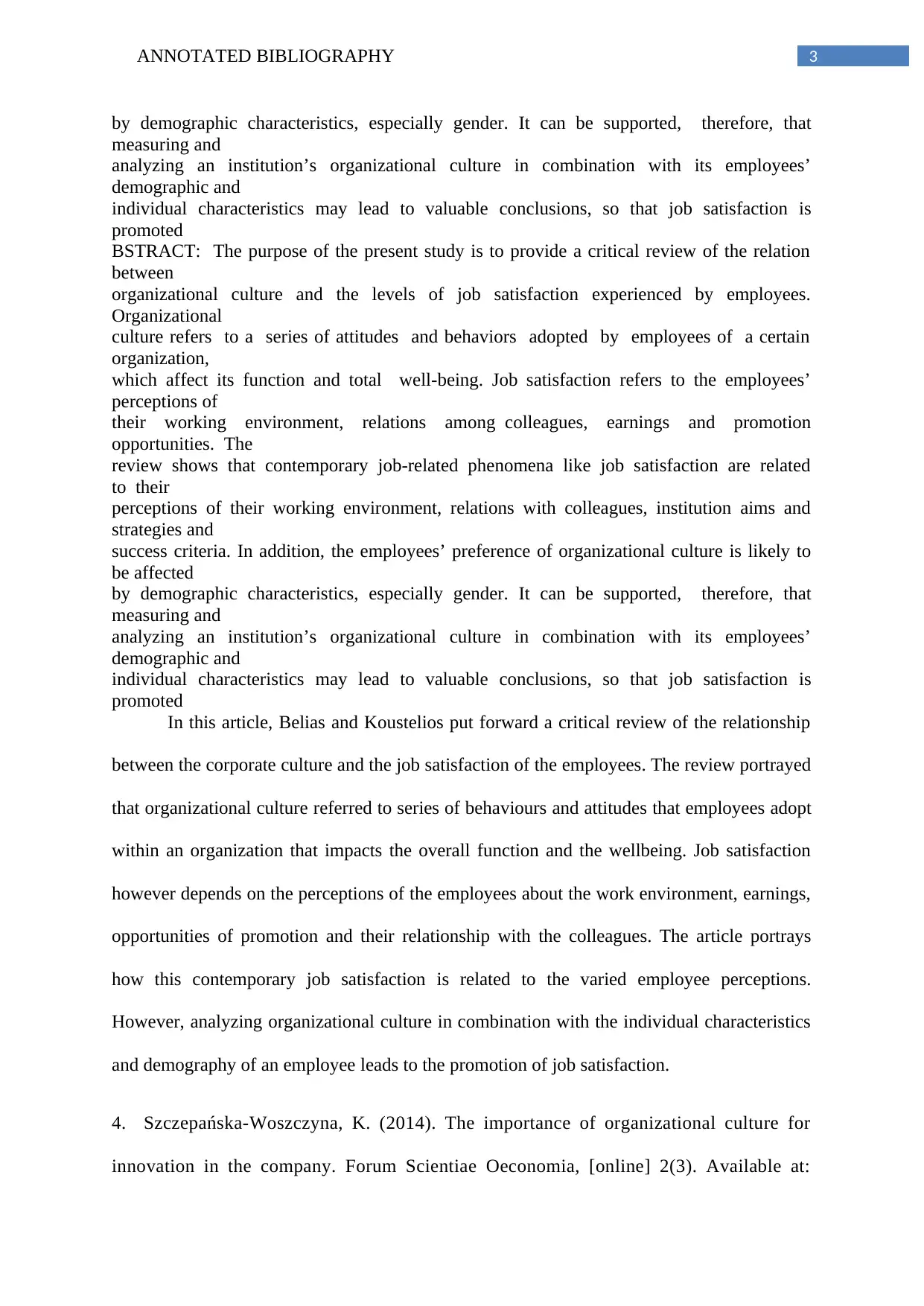
3ANNOTATED BIBLIOGRAPHY
by demographic characteristics, especially gender. It can be supported, therefore, that
measuring and
analyzing an institution’s organizational culture in combination with its employees’
demographic and
individual characteristics may lead to valuable conclusions, so that job satisfaction is
promoted
BSTRACT: The purpose of the present study is to provide a critical review of the relation
between
organizational culture and the levels of job satisfaction experienced by employees.
Organizational
culture refers to a series of attitudes and behaviors adopted by employees of a certain
organization,
which affect its function and total well-being. Job satisfaction refers to the employees’
perceptions of
their working environment, relations among colleagues, earnings and promotion
opportunities. The
review shows that contemporary job-related phenomena like job satisfaction are related
to their
perceptions of their working environment, relations with colleagues, institution aims and
strategies and
success criteria. In addition, the employees’ preference of organizational culture is likely to
be affected
by demographic characteristics, especially gender. It can be supported, therefore, that
measuring and
analyzing an institution’s organizational culture in combination with its employees’
demographic and
individual characteristics may lead to valuable conclusions, so that job satisfaction is
promoted
In this article, Belias and Koustelios put forward a critical review of the relationship
between the corporate culture and the job satisfaction of the employees. The review portrayed
that organizational culture referred to series of behaviours and attitudes that employees adopt
within an organization that impacts the overall function and the wellbeing. Job satisfaction
however depends on the perceptions of the employees about the work environment, earnings,
opportunities of promotion and their relationship with the colleagues. The article portrays
how this contemporary job satisfaction is related to the varied employee perceptions.
However, analyzing organizational culture in combination with the individual characteristics
and demography of an employee leads to the promotion of job satisfaction.
4. Szczepańska-Woszczyna, K. (2014). The importance of organizational culture for
innovation in the company. Forum Scientiae Oeconomia, [online] 2(3). Available at:
by demographic characteristics, especially gender. It can be supported, therefore, that
measuring and
analyzing an institution’s organizational culture in combination with its employees’
demographic and
individual characteristics may lead to valuable conclusions, so that job satisfaction is
promoted
BSTRACT: The purpose of the present study is to provide a critical review of the relation
between
organizational culture and the levels of job satisfaction experienced by employees.
Organizational
culture refers to a series of attitudes and behaviors adopted by employees of a certain
organization,
which affect its function and total well-being. Job satisfaction refers to the employees’
perceptions of
their working environment, relations among colleagues, earnings and promotion
opportunities. The
review shows that contemporary job-related phenomena like job satisfaction are related
to their
perceptions of their working environment, relations with colleagues, institution aims and
strategies and
success criteria. In addition, the employees’ preference of organizational culture is likely to
be affected
by demographic characteristics, especially gender. It can be supported, therefore, that
measuring and
analyzing an institution’s organizational culture in combination with its employees’
demographic and
individual characteristics may lead to valuable conclusions, so that job satisfaction is
promoted
In this article, Belias and Koustelios put forward a critical review of the relationship
between the corporate culture and the job satisfaction of the employees. The review portrayed
that organizational culture referred to series of behaviours and attitudes that employees adopt
within an organization that impacts the overall function and the wellbeing. Job satisfaction
however depends on the perceptions of the employees about the work environment, earnings,
opportunities of promotion and their relationship with the colleagues. The article portrays
how this contemporary job satisfaction is related to the varied employee perceptions.
However, analyzing organizational culture in combination with the individual characteristics
and demography of an employee leads to the promotion of job satisfaction.
4. Szczepańska-Woszczyna, K. (2014). The importance of organizational culture for
innovation in the company. Forum Scientiae Oeconomia, [online] 2(3). Available at:
Paraphrase This Document
Need a fresh take? Get an instant paraphrase of this document with our AI Paraphraser
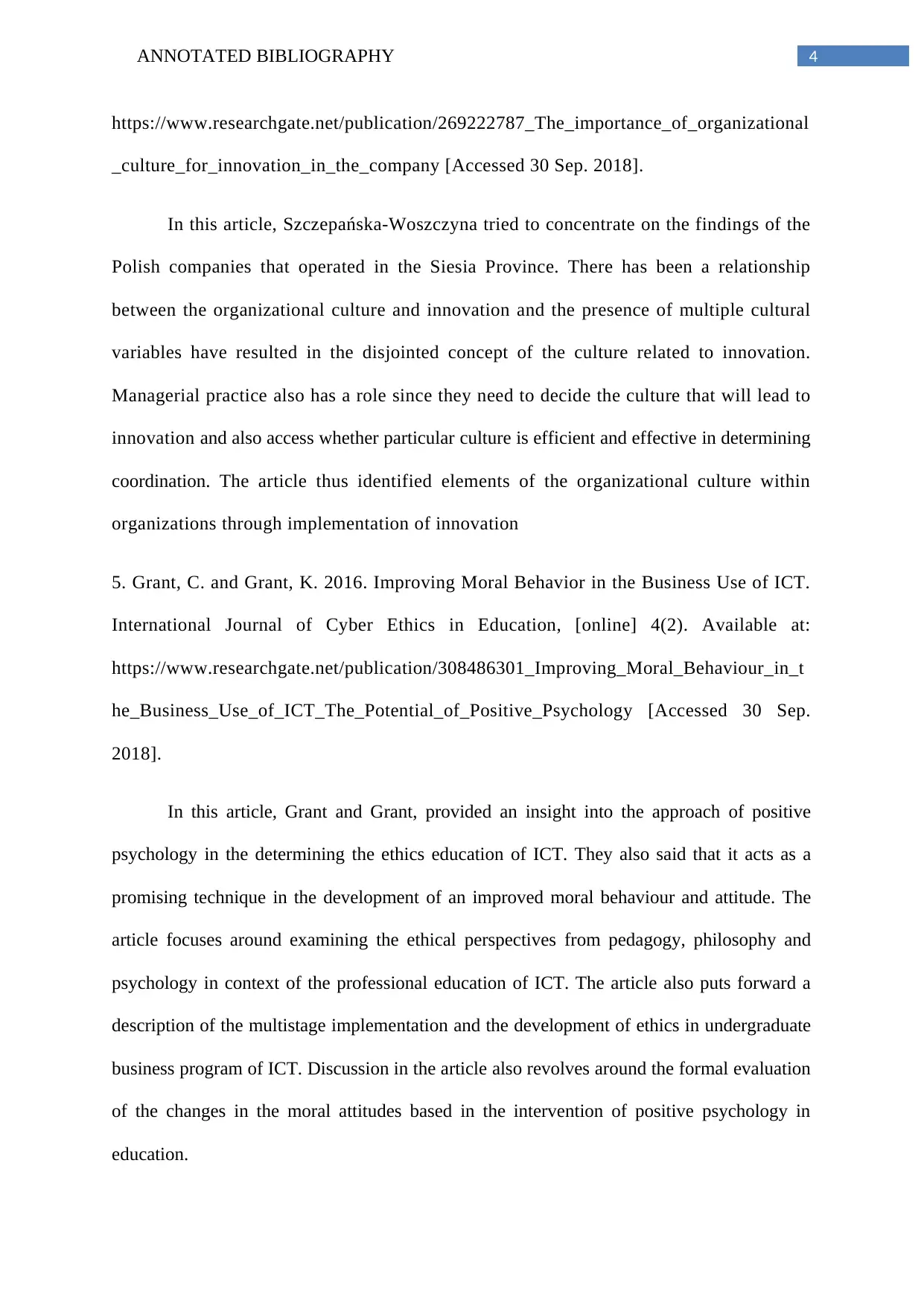
4ANNOTATED BIBLIOGRAPHY
https://www.researchgate.net/publication/269222787_The_importance_of_organizational
_culture_for_innovation_in_the_company [Accessed 30 Sep. 2018].
In this article, Szczepańska-Woszczyna tried to concentrate on the findings of the
Polish companies that operated in the Siesia Province. There has been a relationship
between the organizational culture and innovation and the presence of multiple cultural
variables have resulted in the disjointed concept of the culture related to innovation.
Managerial practice also has a role since they need to decide the culture that will lead to
innovation and also access whether particular culture is efficient and effective in determining
coordination. The article thus identified elements of the organizational culture within
organizations through implementation of innovation
5. Grant, C. and Grant, K. 2016. Improving Moral Behavior in the Business Use of ICT.
International Journal of Cyber Ethics in Education, [online] 4(2). Available at:
https://www.researchgate.net/publication/308486301_Improving_Moral_Behaviour_in_t
he_Business_Use_of_ICT_The_Potential_of_Positive_Psychology [Accessed 30 Sep.
2018].
In this article, Grant and Grant, provided an insight into the approach of positive
psychology in the determining the ethics education of ICT. They also said that it acts as a
promising technique in the development of an improved moral behaviour and attitude. The
article focuses around examining the ethical perspectives from pedagogy, philosophy and
psychology in context of the professional education of ICT. The article also puts forward a
description of the multistage implementation and the development of ethics in undergraduate
business program of ICT. Discussion in the article also revolves around the formal evaluation
of the changes in the moral attitudes based in the intervention of positive psychology in
education.
https://www.researchgate.net/publication/269222787_The_importance_of_organizational
_culture_for_innovation_in_the_company [Accessed 30 Sep. 2018].
In this article, Szczepańska-Woszczyna tried to concentrate on the findings of the
Polish companies that operated in the Siesia Province. There has been a relationship
between the organizational culture and innovation and the presence of multiple cultural
variables have resulted in the disjointed concept of the culture related to innovation.
Managerial practice also has a role since they need to decide the culture that will lead to
innovation and also access whether particular culture is efficient and effective in determining
coordination. The article thus identified elements of the organizational culture within
organizations through implementation of innovation
5. Grant, C. and Grant, K. 2016. Improving Moral Behavior in the Business Use of ICT.
International Journal of Cyber Ethics in Education, [online] 4(2). Available at:
https://www.researchgate.net/publication/308486301_Improving_Moral_Behaviour_in_t
he_Business_Use_of_ICT_The_Potential_of_Positive_Psychology [Accessed 30 Sep.
2018].
In this article, Grant and Grant, provided an insight into the approach of positive
psychology in the determining the ethics education of ICT. They also said that it acts as a
promising technique in the development of an improved moral behaviour and attitude. The
article focuses around examining the ethical perspectives from pedagogy, philosophy and
psychology in context of the professional education of ICT. The article also puts forward a
description of the multistage implementation and the development of ethics in undergraduate
business program of ICT. Discussion in the article also revolves around the formal evaluation
of the changes in the moral attitudes based in the intervention of positive psychology in
education.

5ANNOTATED BIBLIOGRAPHY
⊘ This is a preview!⊘
Do you want full access?
Subscribe today to unlock all pages.

Trusted by 1+ million students worldwide
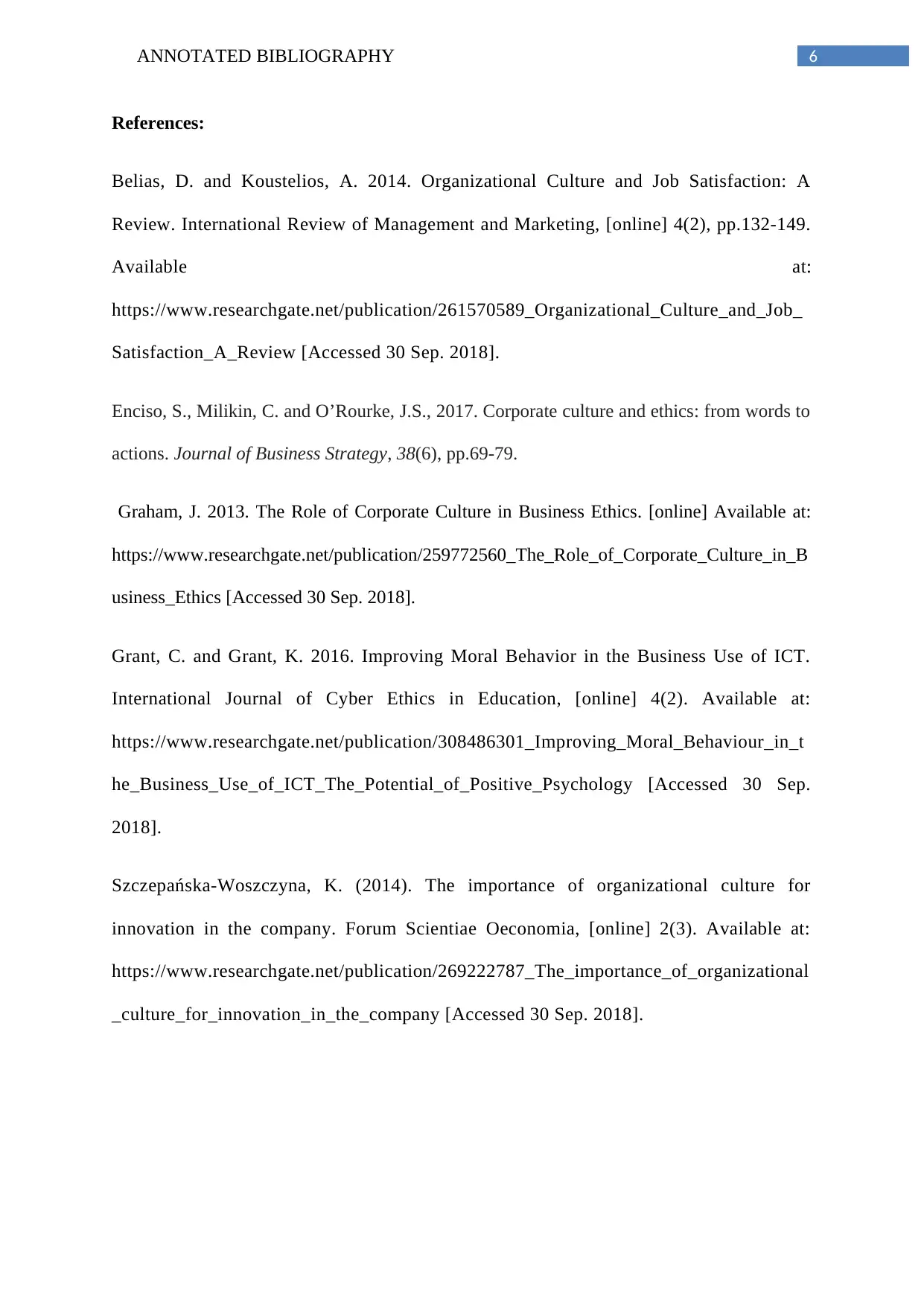
6ANNOTATED BIBLIOGRAPHY
References:
Belias, D. and Koustelios, A. 2014. Organizational Culture and Job Satisfaction: A
Review. International Review of Management and Marketing, [online] 4(2), pp.132-149.
Available at:
https://www.researchgate.net/publication/261570589_Organizational_Culture_and_Job_
Satisfaction_A_Review [Accessed 30 Sep. 2018].
Enciso, S., Milikin, C. and O’Rourke, J.S., 2017. Corporate culture and ethics: from words to
actions. Journal of Business Strategy, 38(6), pp.69-79.
Graham, J. 2013. The Role of Corporate Culture in Business Ethics. [online] Available at:
https://www.researchgate.net/publication/259772560_The_Role_of_Corporate_Culture_in_B
usiness_Ethics [Accessed 30 Sep. 2018].
Grant, C. and Grant, K. 2016. Improving Moral Behavior in the Business Use of ICT.
International Journal of Cyber Ethics in Education, [online] 4(2). Available at:
https://www.researchgate.net/publication/308486301_Improving_Moral_Behaviour_in_t
he_Business_Use_of_ICT_The_Potential_of_Positive_Psychology [Accessed 30 Sep.
2018].
Szczepańska-Woszczyna, K. (2014). The importance of organizational culture for
innovation in the company. Forum Scientiae Oeconomia, [online] 2(3). Available at:
https://www.researchgate.net/publication/269222787_The_importance_of_organizational
_culture_for_innovation_in_the_company [Accessed 30 Sep. 2018].
References:
Belias, D. and Koustelios, A. 2014. Organizational Culture and Job Satisfaction: A
Review. International Review of Management and Marketing, [online] 4(2), pp.132-149.
Available at:
https://www.researchgate.net/publication/261570589_Organizational_Culture_and_Job_
Satisfaction_A_Review [Accessed 30 Sep. 2018].
Enciso, S., Milikin, C. and O’Rourke, J.S., 2017. Corporate culture and ethics: from words to
actions. Journal of Business Strategy, 38(6), pp.69-79.
Graham, J. 2013. The Role of Corporate Culture in Business Ethics. [online] Available at:
https://www.researchgate.net/publication/259772560_The_Role_of_Corporate_Culture_in_B
usiness_Ethics [Accessed 30 Sep. 2018].
Grant, C. and Grant, K. 2016. Improving Moral Behavior in the Business Use of ICT.
International Journal of Cyber Ethics in Education, [online] 4(2). Available at:
https://www.researchgate.net/publication/308486301_Improving_Moral_Behaviour_in_t
he_Business_Use_of_ICT_The_Potential_of_Positive_Psychology [Accessed 30 Sep.
2018].
Szczepańska-Woszczyna, K. (2014). The importance of organizational culture for
innovation in the company. Forum Scientiae Oeconomia, [online] 2(3). Available at:
https://www.researchgate.net/publication/269222787_The_importance_of_organizational
_culture_for_innovation_in_the_company [Accessed 30 Sep. 2018].
Paraphrase This Document
Need a fresh take? Get an instant paraphrase of this document with our AI Paraphraser

7ANNOTATED BIBLIOGRAPHY
1 out of 8
Your All-in-One AI-Powered Toolkit for Academic Success.
+13062052269
info@desklib.com
Available 24*7 on WhatsApp / Email
![[object Object]](/_next/static/media/star-bottom.7253800d.svg)
Unlock your academic potential
Copyright © 2020–2025 A2Z Services. All Rights Reserved. Developed and managed by ZUCOL.
